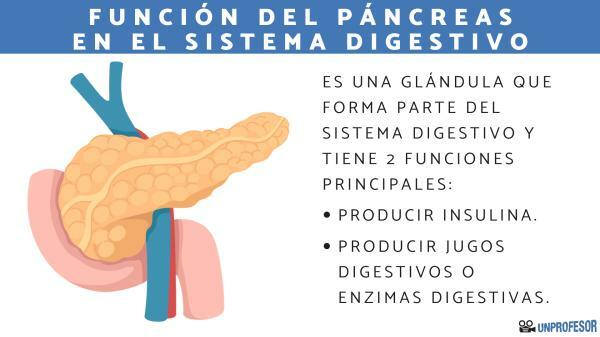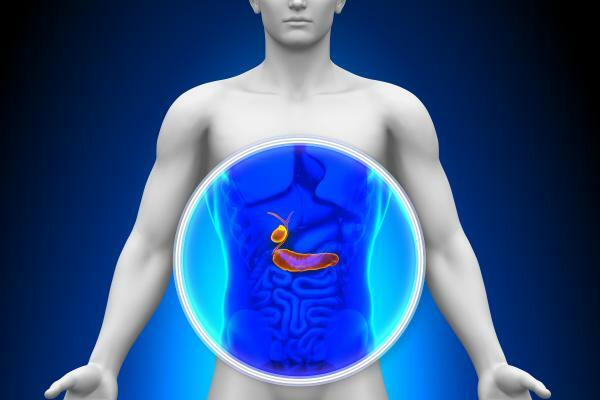Function of the pancreas in the digestive system

The pancreas is a gland that is part of the digestive system and is located behind the stomach, very close to the part of the intestine called the duodenum. This organ has two main functions: producing insulin and producing digestive juices or enzymes that are capable of digesting food.
In this lesson from a TEACHER, we are going to explain to you in more detail what is the function of the pancreasin the digestive system and why it is so important for the proper functioning of our body.
The pancreas is a fundamental organ for digestion of food. It is a gland that is part of the digestive system and has an elongated shape, about 20 centimeters in length and 200 grams in weight.
It is located in the upper part of the abdominal cavity, just behind the stomach and intestine. In addition, it is closely linked to the liver and bile ducts.
In this other lesson from a TEACHER we show you the Organs of the digestive system.

As we have mentioned previously, the pancreas has two main functions, very important for our digestive system to function correctly. Its main functions are
secrete enzymes and produce hormones, such as insulin, but these are not the only missions it fulfills.Secrete enzymes (Exocrine function)
Enzymes secreted by the pancreas help break down carbohydrates, fats, proteins and acids in the duodenum. These enzymes go down the pancreatic duct to the common bile duct, in an inactive state; but when they reach the duodenum they are activated. Some of the digestive enzymes generated by the pancreas are amylase, lipase and trypsin.
Production of insulin and glucagon (Endocrine function)
The pancreas contains specialized cells called beta cells and islets of Langerhans that produce hormones such as insulin and glucagon. Insulin helps reduce blood glucose levels, since it facilitates the absorption of glucose by cells, for use as energy or storage. Glucagon increases blood glucose levels by stimulating the release of stored glucose in the liver when levels are low.
Somatostatin production
In addition to insulin and glucagon, the pancreas secretes somatostatin, which inhibits the release of insulin and glucagon, and has a role in regulating nutrient absorption in the gastrointestinal tract.
Regulation of acid-base balance
The pancreas too secretes bicarbonate in the small intestine, to neutralize the acidity of the chyme (partially digested food) that arrives from the stomach.
Enteric peptidase production
The pancreas produces enteric peptidase, a substance that aids in further breakdown of peptides in the small intestine.
Regulation of nutrient metabolism
Through its endocrine functions, the pancreas plays a crucial role in regulating the carbohydrate, fat and protein metabolism.

The pancreas is an organ with little nervous sensitivity, so people who suffer from alterations do not usually notice them until they are very acute. Unfortunately, most of pancreas diseases They are quite serious. We present them to you.
diabetes
diabetes type 1 and type 2 They are directly related to problems with insulin and therefore affect the pancreas. In type 1 diabetes, the pancreas completely loses the ability to produce insulin. In type 2 diabetes, on the other hand, insulin resistance is generated and the body's cells partially or completely lose their ability to use insulin.
Either way, blood sugar level increases and it can be very dangerous.
pancreatitis
Pancreatitis is due to pancreatic enzymes being activated in the ducts of the pancreas instead of in the duodenum. Enzymes eat pancreas tissue and cause bleeding and possible infections, leading to inflammation.
adenocarcinoma
Adenocarcinoma is the most common type of cancer of the pancreas and is caused by tumors that develop in the exocrine ducts and tissue.
To take care of our pancreas correctly and prevent any disease it may cause, it is important to maintain a healthy lifestyle. We leave you with some recommendations that can help you:
- Maintain a healthy weight: Excess weight increases the risk of type 2 diabetes. Adopting a balanced diet and engaging in regular physical activity helps maintain a healthy weight.
- Eat a healthy diet: Eating a diet rich in fruits, vegetables, whole grains, and lean proteins can help maintain stable blood sugar levels and keep your pancreas healthy. Limit the intake of saturated and trans fats, as well as added sugars.
- Avoid tobacco and alcohol: Tobacco and excessive alcohol consumption are associated with an increased risk of pancreatic diseases. Avoiding tobacco and limiting alcohol consumption can help reduce this risk.
- Control blood sugar: Maintain healthy blood glucose levels, as diabetes is a risk factor for pancreatic diseases. This can be achieved through a healthy diet, regular exercise, and, if necessary, prescription medications.
- Exercise regularly: Regular physical activity not only helps maintain a healthy weight, but also improves insulin sensitivity and reduces the risk of metabolic diseases.
- Avoid exposure to toxic substances: Limit exposure to chemicals and toxic substances in the environment, as some of these can have negative effects on the pancreas.
- Control hereditary risk factors: If you have a family history of pancreatic diseases, talk to your doctor about preventative measures and regular checkups that may be necessary.
- Perform regular medical checkups: Talk to your doctor about your medical history and any symptoms or concerns related to the pancreas.
We hope that this lesson has helped you understand well what the function of the pancreas is in the digestive system and why it is so important that we take good care of this organ. Now we recommend reading this other lesson from a TEACHER about What is an enzyme and its function.
